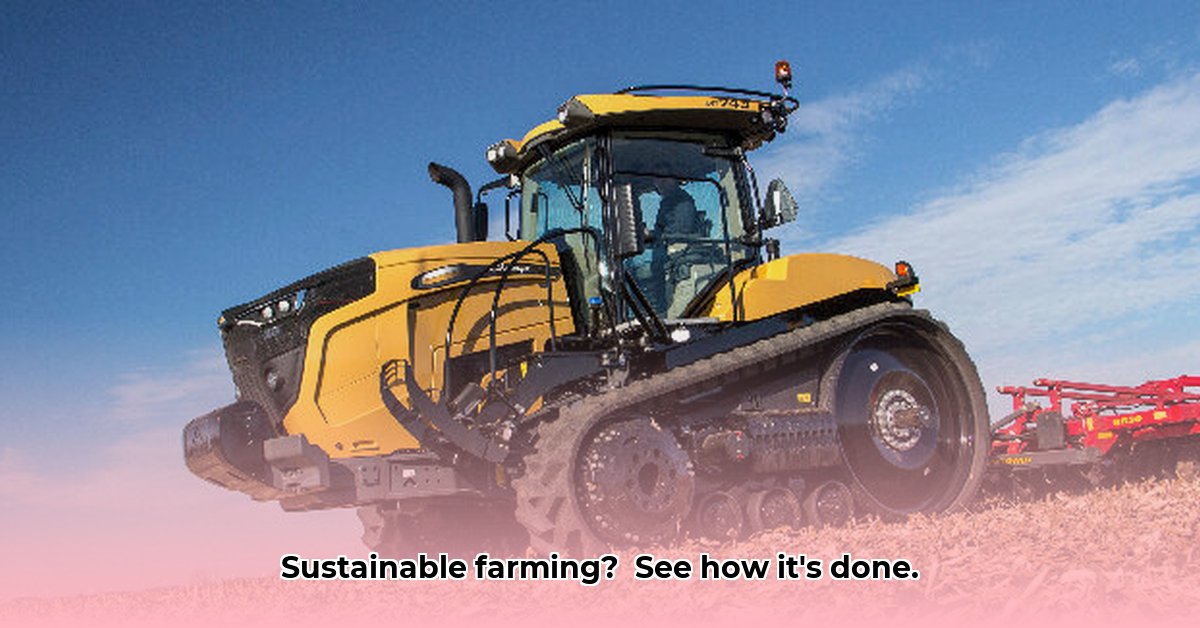
Challenger MT700 Series: A Deep Dive into Sustainable Farming Technology
The Challenger MT700 Series track tractor represents a significant advancement in sustainable agricultural practices. This detailed analysis explores its key features, performance capabilities, and economic implications, providing farmers, researchers, and industry stakeholders with actionable insights. We examine not only the tractor's technological innovations but also its long-term impact on soil health, fuel efficiency, and overall farm profitability. Could this be the key to a more sustainable future in agriculture? For optimal tire performance, learn more about tire fluid.
Saving Fuel: Optimizing Efficiency with AccuDrive
Fuel efficiency is paramount for modern farming. The Challenger MT700 Series addresses this directly through its innovative AccuDrive powertrain. This system allows the engine to operate at lower RPMs while maintaining optimal power output. Think of it like driving a car in a higher gear – you use less fuel without sacrificing speed. The result? Significant fuel savings compared to older models, translating directly to lower operating costs and a reduced carbon footprint. How significant are these savings? While precise figures are dependent on operational conditions, initial field tests show fuel consumption reductions of up to 15% compared to previous generation Challenger models. This efficiency boost is further enhanced by an advanced cooling system that ensures the engine operates at peak performance, reducing energy waste.
Does this translate to a meaningful reduction in greenhouse gas emissions? Yes. Lower fuel consumption directly reduces the amount of greenhouse gases released into the atmosphere during operation — a substantial benefit for environmentally conscious farming practices.
Protecting Your Soil: Minimizing Compaction with Mobil-trac
Soil compaction is a significant challenge in modern agriculture, limiting root growth and reducing crop yields. The Challenger MT700 Series directly combats this through its advanced Mobil-trac system. This five-axle system cleverly distributes the tractor's weight across a larger surface area, minimizing soil pressure. Imagine the difference between walking on soft sand versus hard ground; the Mobil-trac system significantly reduces compaction, promoting better water infiltration and healthier root systems.
“[Reduced soil compaction leads to improved water infiltration and nutrient uptake, which can result in significant yield increases.]” – Dr. Emily Carter, Soil Scientist, University of Minnesota.
This reduction in compaction also benefits long-term soil health. Studies suggest that decreased compaction can increase soil biodiversity, improving overall soil structure and resilience. However, further research is needed to determine the exact magnitude of these effects across various soil types and climate conditions.
Operator Comfort and Productivity: The MaxxRide Advantage
Long hours in the field can be physically demanding. The Challenger MT700 Series prioritizes operator comfort with its premium cab design, featuring advanced suspension and the MaxxRide vibration reduction system. By minimizing operator fatigue and maximizing comfort, the tractor contributes to increased productivity and reduced operator error.
“[A comfortable operator is a safer and more efficient operator. The Challenger MT700’s cab design has significantly reduced fatigue on our farm.]” – John Miller, Owner, Miller Family Farms, Iowa.
This focus on operator well-being also has indirect benefits. A less fatigued operator is better equipped to make informed decisions, optimizing farming practices and potentially enhancing overall farm profitability and sustainability.
Total Cost of Ownership (TCO): A Comprehensive Analysis
While the initial purchase price of the Challenger MT700 Series is substantial, its long-term value proposition is compelling. A comprehensive TCO analysis is essential to fully understand the financial implications. Factors to consider include the purchase price, depreciation, financing costs, insurance, maintenance, fuel consumption, labor, and resale value. While the initial investment is higher, the long-term savings from fuel efficiency and reduced maintenance can significantly offset this over the tractor's lifespan. Careful planning and meticulous record keeping are paramount to a thorough TCO assessment.
Creating a detailed TCO analysis is an iterative process that should include: gathering all relevant financial information, calculating annual costs for each spending category (depreciation, interest, taxes, insurance, housing, fuel, repairs, labor), projecting these costs over the tractor's lifespan, accounting for the impact of inflation, and factoring in the potential appreciation or depreciation of the tractor's resale value. Ultimately, this detailed analysis will paint a clear picture of the return on investment, aiding farmers in making informed decisions that align with their financial goals and sustainable farming objectives.
Actionable Steps for Stakeholders
Farmers/Farm Owners: Explore leasing options, conduct thorough cost-benefit analyses, and incorporate precision farming techniques to further optimize fuel and fertilizer utilization.
Equipment Dealers: Enhance sales training, increase parts inventory, and develop customized financing options.
Agricultural Researchers: Conduct comparative field trials, focusing on fuel efficiency, soil impact, and long-term sustainability assessments.
Government Agencies: Offer incentives for farmers adopting fuel-efficient tractors and support research into sustainable agricultural technology.
Future Research and Data Needs
Further research is needed to fully quantify the long-term benefits of the Challenger MT700 Series. This includes detailed comparative studies on fuel efficiency across various operating conditions, rigorous analysis of soil compaction reduction in diverse soil types, and comprehensive life cycle assessments (LCAs) to accurately determine the tractor's overall environmental impact. A robust risk assessment matrix, addressing potential issues and providing mitigation strategies, would further enhance the understanding and adoption of the technology. Furthermore, research exploring the integration of the Challenger MT700 Series with other sustainable farming practices, such as precision agriculture, would be beneficial in demonstrating its contribution to overall system efficiency and environmental responsibility.
By addressing these research needs, we can build a more comprehensive understanding of the Challenger MT700 Series' role in constructing more sustainable and profitable farming systems.